#kyiv center
Text
Oleksandra Romantsova on April to May in Ukraine
Author(s): Scott Douglas Jacobsen
Publication (Outlet/Website): The Good Men Project
Publication Date (yyyy/mm/dd): 2024/06/27
Ms. Oleksandra Romantsova is the Executive Director (2018-present) of the Center for Civil Liberties in Ukraine, which won the Nobel Peace Prize in 2022 under her and others’ leadership in documenting war crimes. This will be a live series on human rights from a…
View On WordPress
#Center for Civil Liberties leadership insights#Executive Director Oleksandra Romantsova updates#Human Rights#Human rights series live from Kyiv#Military aid progress in Ukraine#Nobel laureate#Oleksandra Romantsova#Oleksandra Romantsova on China-Russia relations#Romantsova discusses Ukraine war crimes#Romantsova on Russian-Ukrainian war updates#Romantsova: Black Sea military aid relevance#Ukraine mobilization challenges discussed#US support for Ukrainian sovereignty#War developments: Oleksandra Romantsova insights
0 notes
Text
‼️Approximately 110 missiles were launched by Russia, most of them were shot down, - Zelenskyi
Maternity hospital, educational institutions, shopping center, high-rise buildings and private houses, commercial warehouse, parking lot. Kyiv, Lviv, Odesa, Dnipro, Kharkiv, Zaporizhzhia and our other cities.
Today, Russia was fighting with almost everything it has in its arsenal: "daggers" ("kyndzhaly"), S-300, cruise missiles, UAVs. Strategic bombers launched X-101/X-505. Approximately 110 missiles were fired, most of which were shot down.
Unfortunately, as a result of the shelling, there are dead and wounded.
#ukraine#russia is a terrorist state#russia invades ukraine#russian war crimes#russia ukraine war#russian invasion#russian agression#russian terrorism#russia must burn#fuck russia#russia#genocide of ukrainians
2K notes
·
View notes
Video
youtube
Vladimir Putin Visits Training Center For Mobilized Reservists. #ukraine...
#youtube#Vladimir Putin Visits Training Center For Mobilized Reservists. ukraine kyiv moscow kherson news europe eu asia germany usa uk Russian Pres
0 notes
Text
My next post in support of Ukraine is:
Next site, is another Ukrainian. Kateryna Vasylivna Bilokur (Катерина Василівна Білокур), a folk artist who was born in the village of Bohdanivka in what is now Kyiv Oblast in 1900. She started drawing as a child, even though her parents wouldn't allow it. She continued to secretly draw on rags using coal. She eventually started painting. In 1940, she sent a drawing of a viburnum to singer Oksana Petrusenko after hearing her sing, "Or Was I Not the Viburnum on the Meadow" on the radio. It impressed the singer so much that she consulted with the Folk Art Center, which led to someone going to Bohdanivka to find the artist and her artworks. An exhibit was held later in 1940 of Kateryna's full collection of paintings, which at that time was only 11 paintings. In 1951, she was awarded the "Badge of Honor," and named an "Honored Art Worker of the Ukrainian SSR." She mostly painted flowers, but also some landscapes and portraits. In 2000, she was honored on a Ukrainian stamp. She passed away in 1961 after having an unsuccessful surgery.
#StandWithUkraine
#СлаваУкраїні 🇺🇦🌻





227 notes
·
View notes
Text
Fight for them as they fought for you
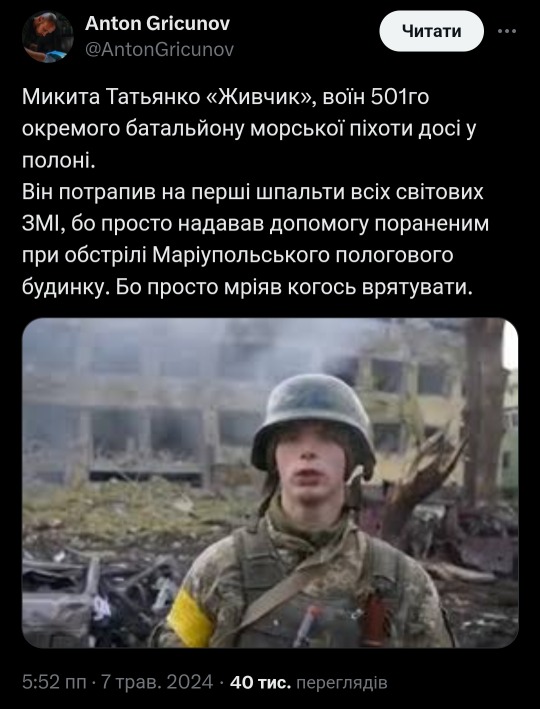
Mykyta Tatyanko "Zhyvchyk", a soldier of the 501st separate marine battalion, is still in captivity.
He hit the front pages of all the world's media because he was simply helping the wounded during the shelling of the Mariupol maternity hospital. Because he just wanted to save someone.
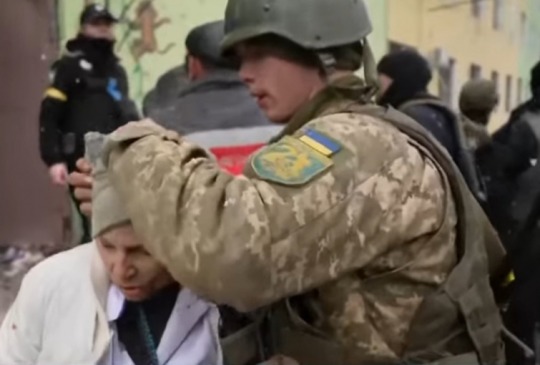
In Mariupol, Zhyvchyk provided moral support to the locals. Ksenia, a resident of the city, met the soldier when a residential area was shelled. That day, March 12, her family was injured and slaughtered - her 16-year-old son and her sister's husband were killed instantly.
"I was in a state of shock: I wanted to commit suicide because half of my family was killed in front of me, and the other half was not sure if they would survive," Ksenia said.
The young defender helped the woman to keep her morale up. Mykyta convinced her that she shouldn't do anything to herself because many people around her needed help.
"You are needed here, let's go help," Ksenia recalls.
Ksenia told Mykyta's mother, Larysa, everything in detail, and told her that she had become the heroine of a movie about Mariupol. She also talked a lot about Mykyta in the movie, but she didn't give them any details. They are still in touch. Once she said: "Maybe you will be offended by me, but now Mykyta will be my adopted son." And Larysa was very happy about that, because now they both pray for him sincerely.
Larysa was also contacted by one of the guys who was in the TRO and headed the security of the hospital in the city center. In a conversation with the soldier's mother, the defender said that in Mariupol, her son shared his food and medicine with the residents. Mykyta gave away almost everything he had.
❗In these pictures, he is 19 years old. At the age of 18, he voluntarily chose the path of the military, which even before the full-scale war, he was in the east part of Ukraine. Mykyta has been in captivity for almost 2 years, so he is now 21.
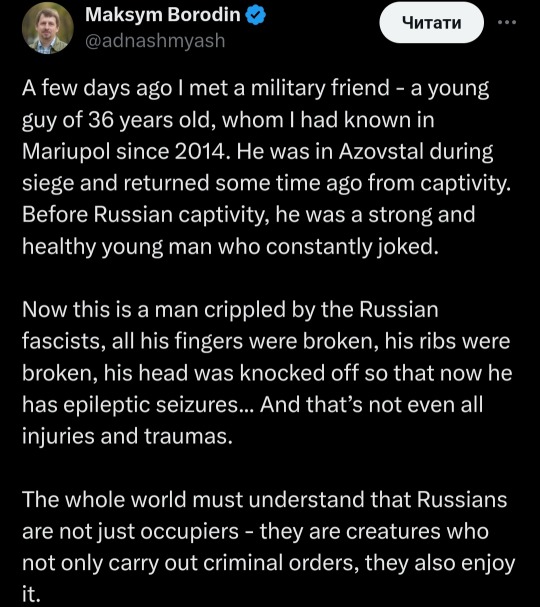
Please, share stories of our defenders in captivity. Many of them, including Mykyta have been there more than 2 years. You can only imagine what Russians do and tell them. Russians entertain themselves by breaking people, especially Ukrainians. They fiercely hate people who protect and fight for freedom. I hope our people find even more power in themselves to live through the hell of russian captivity. And when defenders all come back to their homeland, they will be themselves, in a healthy state like body and mind. There so many people are waiting for them. They deserve only good things after all of that.
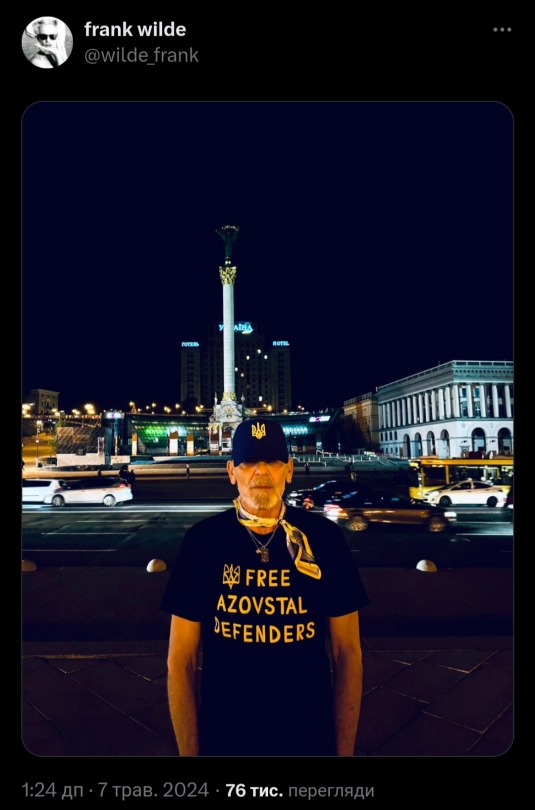
The gorgeous Frank with important message in Kyiv.
#ukraine#20 days in mariupol#zaporizhzhia#free azov#free azovstal defenders#free mariupol defenders#free defenders#russia is a terrorist state#russian invasion of ukraine#russo ukrainian war#russia must burn#stop the genocide#war in ukraine#world#united arab emirates#united states#stand with ukraine#standwithukraine#український tumblr#український тамблер#important#signal boost#please reblog#please share#genocide#text
149 notes
·
View notes
Note
Hwy dod we even need to send more money to Ukraine tho like we’ve already supported them plenty! But let Europe pull their weight and we can go back to spending that money on American policies
Do you read like, any news outside Tumblr, any Ukrainian perspectives, any basic analyses of the conflict, any rationale from Democrats or Congress, or anything? Because, in brief:
Ukrainians are currently facing a full-scale genocide. It has been going on for over a year and Russian military leadership has every plan to continue until fruition. If they stop resisting, there will be no more Ukraine or Ukrainians. So all the "appeasers" or "realists" insisting that Ukraine should "give up land for peace" (which notably worked so well with Czechoslovakia and Hitler in 1938) are basically deciding that it's fine to let the genocide be carried out, if it's even minorly inconvenient for us. Putin and cronies have repeatedly stated that if they are successful in taking Ukraine, they will go further. This is the exact scenario that leads to the "escalation" and/or WWIII that various people keep wringing their hands over. It is far more just and safe for Ukraine to be supported now and to stop that before it gets even worse.
America is not actually giving over buckets of black cash, regardless of what various bad-faith takes claim. They are handing over weapons valued at various amounts of money, along with some financial and budgetary aid. A lot of these weapons are older and would cost more to decommission than they cost to give to a sovereign democracy fighting for its life against an imperialist autocratic neighbor. This is some tiny amount like 5% (if that) of America's bloated military budget. And again: it's actual weapons valued at a certain dollar amount. These cannot be spent on American domestic policies.
The idea that helping Ukraine is directly coming out of our own pockets or preventing us from spending as needed on our own needs is propaganda. It is not good to repeat it.
I wrote this post the other day about why Putin is trying so hard to break American/Western support for Ukraine, and why the hard-right MAGA has enabled him in it. Putin's Russia is the motivating nexus, coordination, and funding center for Russian/European/American far-right theocratic fascism. This whole "America Only" is the exact rationale that appeals to said far-right domestic fascists and gives Putin and other imperial expansionist kleptocrats the justification to just throw away post-WWII international order and declare that any larger and more powerful state can systematically eradicate any neighboring country, claim its territory, destroy its government, kill its people, and get away with it. Because why would they stop, if there aren't any consequences and they are rewarded for it?
Putin has repeatedly interfered in American elections to help Trump and the Republicans. That should tell you something about who he sees as most favorable to his interests and what he would do again if allowed to emerge victorious.
Europe IS actually pulling its weight! They just brought all 27 defense ministers to Kyiv, they have been working on Ukraine's accession talks, they have committed all types of weapons (including the long-range missiles that the US still won't clearly authorize), they've committed a new tranche of 5 billion euros in long-term assistance, etc. But the whole "we should pull out of NATO and leave Europe to fend for itself" was a key isolationist and xenophobic Trump idea. We can see what that led to.
American aid is vital to Ukraine's continued existence as a sovereign country, period, and it is in American interests to continue to provide it as agreed upon. Not least because such an egregious betrayal of a democratic ally would empower the fascists of the world, both Russian and American, and because as noted, if this conflict was not stopped and got bigger, it would then involve American troops. It is a moral, democratic, political, and ethical imperative. This is not a difficult call or a complicated situation, regardless of what the Online Leftist tankies and the MAGA-world nutcases (because horseshoe theory) want you to think.
Слава Україні.
The end.
455 notes
·
View notes
Text
ice skating, Kyiv, Ukraine: Kyiv is the capital and most populous city of Ukraine. It is in north-central Ukraine along the Dnieper River. As of 1 January 2022, its population was 2,952,301, making Kyiv the seventh-most populous city in Europe. Kyiv is an important industrial, scientific, educational, and cultural center in Eastern Europe. Wikipedia
74 notes
·
View notes
Text
HOW TO SUPPORT POLITICAL PRISONERS? WRITE THEM A LETTER
According to the latest data from the Mission of the President of Ukraine in the Autonomous Republic of Crimea, Russia is illegally holding 209 Crimean political prisoners, including 126 Crimean Tatars. The Russian Federation is persecuting Ukrainian citizens for religious reasons (e.g. Jehovah’s Witnesses and Cases of Crimean Muslims), journalistic and human rights activities, and anti-war protests. It is also fabricating sabotage, terrorism, extremism and espionage cases.
Sending political prisoners letters or postcards is the easiest way to give them moral support and let them know they're no alone. Choose a Kremlin prisoner and send them a letter or postcard from February 19 to May 19.

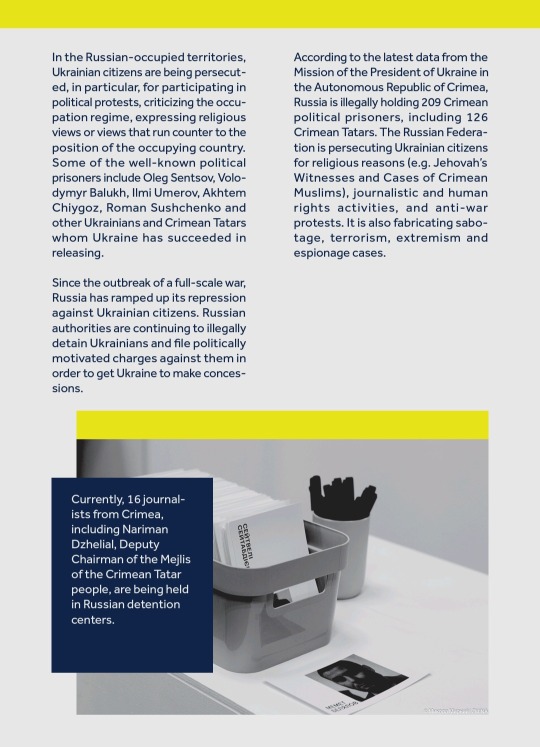

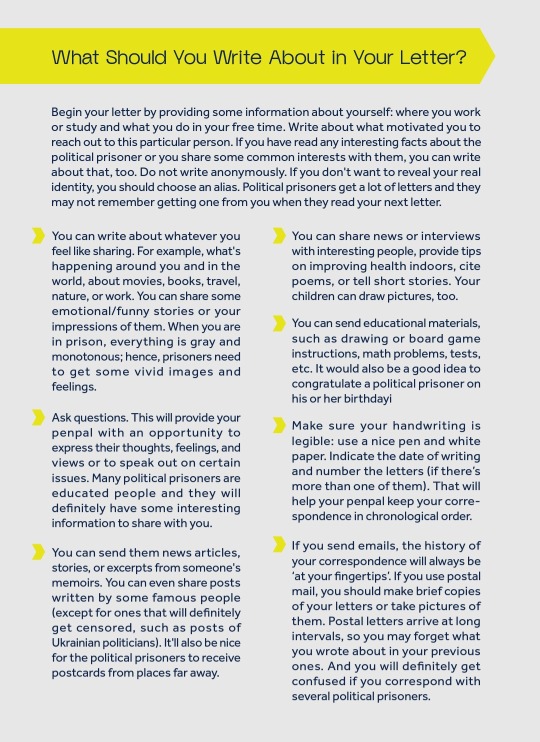
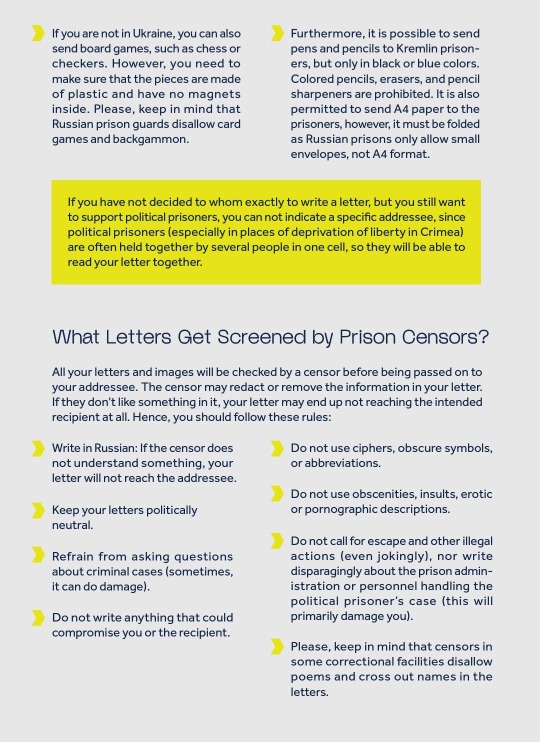
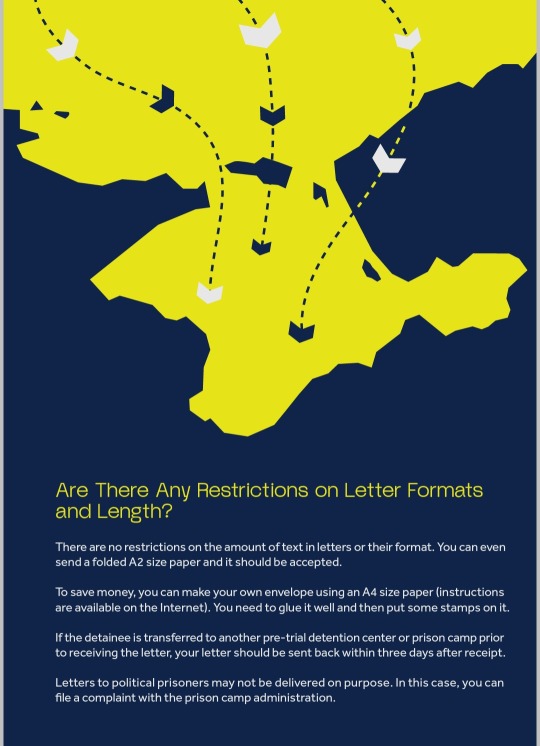
Physical address: Kyiv, 01001, P.O. Box B-539, Human Rights Information Center
E-mail: [email protected]
Text should be in russian (message me if you need help with translation) and politically neutral.
#Ukraine#crimean tatars#crimea#russia#russia is a terrorist state#fuck russia#genocide#stand with ukraine#support ukraine#russian war crimes#russian culture#letters
164 notes
·
View notes
Text
When most Americans think of fascism, they picture a Hitlerian hellscape of dramatic action: police raids, violent coups, mass executions. Indeed, such was the savagery of Nazi Germany, Stalinist Russia, and Vichy France. But what many people don’t appreciate about tyranny is its “banality,” Timothy Snyder tells me. “We don’t imagine how a regime change is going to be at the dinner table. The regime change is going to be on the sidewalk. It’s going to be in your whole life.”
Snyder, a Yale history professor and leading scholar of Soviet Russia, was patching into Zoom from a hotel room in Kyiv, where the specter of authoritarianism looms large as Ukraine remains steeped in a yearslong military siege by Vladimir Putin. It was late at night and he was still winding down from, and gearing up for, a packed schedule—from launching an institution dedicated to the documentation of the war, to fundraising for robotic-demining development, to organizing a conference for a new Ukrainian history project. “I’ve had kind of a long day and a long week, and if this were going to be my sartorial first appearance in Vanity Fair, I would really want it to go otherwise,” he joked.
But the rest of our conversation was no laughing matter. It largely centered, to little surprise, on Donald Trump and how the former president has put America on a glide path to fascism. Too many commentators were late to realize this. Snyder, however, has been sounding the alarm since the dawn of Trumpism itself, invoking the cautionary tales of fascist history in his 2017 book, On Tyranny, and in The Road to Unfreedom the year after. It’s been six years since the latter, and Snyder is now out with a new book, On Freedom, a personal and philosophical attempt to flip the valence of America’s most lauded—and loaded—word. “We Americans tend to think that freedom is a matter of things being cleared away, and that capitalism does that work for us. It is a trap to believe in this,” he writes. “Freedom is not an absence but a presence, a life in which we choose multiple commitments and realize combinations of them in the world.”
In an interview with Vanity Fair, which has been edited for length and clarity, Snyder unpacks America’s “strongman fantasy,” encourages Democrats to reclaim the concept of freedom, and critiques journalists for pushing a “war fatigue” narrative about the Russian invasion of Ukraine. “There’s just something so odd about Americans being tired of this war. We can get bored of it or whatever, but how can we be tired?” he asks. “We’re not doing a damn thing.”
Vanity Fair: The things we associate with freedom—free speech, religious liberty—have been co-opted by the Republican Party. Do you think you could walk me through how that happened historically and how Democrats could take that word back?
Timothy Snyder: Yeah. I think the way it happened historically is actually quite dark there. There’s an innocent way of talking about this, which is to say, “Oh, some people believe in negative freedom and some people believe in positive freedom—and negative freedom just means less government and positive freedom means more government.” And when you say it like that, it just sounds like a question of taste. And who knows who’s right?
Whereas historically speaking, to answer your question, the reason why people believe in negative freedom is that they’re enslaving other people, or they are oppressing women, or both. The reason why you say freedom is just keeping the government off my back is that the central government is the only force that’s ever going to enfranchise those slaves. It’s the only force which is ever going to give votes to those women. And so that’s where negative freedom comes from. I’m not saying that everybody who believes in negative freedom now owns slaves or oppresses women, but that’s the tradition. That’s the reason why you would think freedom is negative, which on its face is a totally implausible idea. I mean, the notion that you can just be free because there’s no government makes no sense, unless you’re a heavily drugged anarchist.
And so, as the Republican Party has also become the party of race in our country, it’s become the party of small government. Unfortunately, this idea of freedom then goes along for the ride, because freedom becomes freedom from government. And then the next step is freedom becomes freedom for the market. That seems like a small step, but it’s a huge step because if we believe in free markets, that means that we actually have duties to the market. And Americans have by and large accepted that, even pretty far into the center or into the left. If you say that term, “free market,” Americans pretty generally won’t stop you and say, “Oh, there’s something problematic about that.” But there really is: If the market is free, that means that you have a duty to the market, and the duty is to make sure the government doesn’t intervene in it. And once you make that step, you suddenly find yourself willing to accept that, well, everybody of course has a right to advertise, and I don’t have a right to be free of it. Or freedom of speech isn’t really for me; freedom of speech is for the internet.
And that’s, to a large measure, the world we live in.
You have a quote in the book about this that distills it well: “The countries where people tend to think of freedom as freedom to are doing better by our own measures, which tend to focus on freedom from.”
Yeah, thanks for pulling that out. Even I was a little bit struck by that one. Because if you’re American and you talk about freedom all the time and you also spend all your time judging other countries on freedom, and you decide what the measures are, then you should be close to the top of the list—but you’re not. And then you ask, “Why is that?” When you look at countries like Sweden, Norway, Denmark, France, Germany, or Ireland—that are way ahead of us—they’re having a different conversation about freedom. They don’t seem to talk about freedom as much as we do, but then when they do, they talk about it in terms of enabling people to do things.
And then you realize that an enabled population, a population that has health care and retirement and reliable schools, may be better at defending things like the right to vote and the right to freedom of religion and the right to freedom of speech—the things that we think are essential to freedom. And then you realize, Oh, wait, there can be a positive loop between freedom to and freedom from. And this is the big thing that Americans get a hundred percent wrong. We think there’s a tragic choice between freedom from and freedom to—that you’ve got to choose between negative freedom and positive freedom. And that’s entirely wrong.
What do you make of Kamala Harris’s attempt to redeem the word?
It makes me happy if it’s at the center of a political discussion. And by the way, going back to your first question, it’s interesting how the American right has actually retreated from freedom. It has been central for them for half a century, but they are now actually retreating from it, and they’ve left the ground open for the Democrats. So, politically, I’m glad they’re seizing it—not just because I want them to win, but also because I think on the center left or wherever she is, there’s more of a chance for the word to take on a fuller meaning. Because so long as the Republicans can control the word, it’s always going to mean negative freedom.
I can’t judge the politics that well, but I think it’s philosophically correct and I think we end up being truer to ourselves. Because my big underlying concern as an American is that we have this word which we’ve boxed into a corner and then beaten the pulp out of, and it really doesn’t mean anything anymore. And yet it’s the only imaginable central concept I can think of for American political theory or American political life.
Yeah, it’s conducive to the joy-and-optimism approach that the Democrats are taking to the campaign. Freedom to is about enfranchisement; it’s about empowerment; it’s about mobility.
Totally. Can I jump in there with another thought?
Of course.
I think JD Vance is the logical extension of where freedom as freedom from gets you. Because one of the things you say when freedom is negative—when it’s just freedom from—is that the government is bad, right? You say the government is bad because it’s suppressive. But then you also say government is bad because it can’t do anything. It’s incompetent and it’s dysfunctional. And it’s a small step from there to a JD Vance–type figure who is a doomer, right? He’s a doomer about everything. His politics is a politics of impotence. His whole idea is that government will fail at everything—that there’s no point using government, and in fact, life is just sort of terrible in general. And the only way to lead in life is to kind of be snarky about other people. That’s the whole JD Vance political philosophy. It’s like, “I’m impotent. You’re impotent. We’re all impotent. And therefore let’s be angry.”
Did you watch the debate?
No, I’m afraid I didn’t. I’m in the wrong time zone.
There was a moment that struck me, and I think it would strike you too: Donald Trump openly praised Viktor Orbán, as he has done repeatedly in the past. But he said, explicitly, Orbán is a good guy because he’s a “strongman,” which is a word that he clearly takes to be a compliment, not derogatory. You’ve written about the strongman fantasy in your Substack, so I’m curious: What do you think Trump is appealing to here?
Well, I’m going to answer it in a slightly different way, and then I’ll go back to the way you mean it. I think he’s tapping into one of his own inner fantasies. I think he looks around the world and he sees that there’s a person like Orbán, who’s taken a constitutional system and climbed out of it and has managed to go from being a normal prime minister to essentially being an extraconstitutional figure. And I think that’s what Trump wants for himself. And then, of course, the next step is a Putin-type figure, where he’s now an unquestioned dictator.
For the rest of us, I think he’s tapping—in a minor key—into inexperience, and that was my strongman piece that you kindly mentioned. Americans don’t really think through what it would mean to have a government without the rule of law and the possibility of throwing the bums out. I think we just haven’t thought that through in all of its banality: the neighbors denouncing you, your kids not having social mobility because you maybe did something wrong, having to be afraid all the damn time. African Americans and some immigrants have a sense of this, but in general, Americans don’t get that. They don’t get what that would be like.
So that’s a minor key. The major key, though, is the 20% or so of Americans who really, I think, authentically do want an authoritarian regime, because they would prefer to identify personally with a leader figure and feel good about it rather than enjoy freedom.
You mentioned the word banality, which makes me think of Hannah Arendt’s theory of the “banality of evil.” What would the banality of authoritarianism look like in America?
So let me first talk about the nonbanality of evil, because our version of evil is something like, and I don’t want to be too mean, but it’s something like this: A giant monster rises out of the ocean and then we get it with our F-16s or F-35s or whatever. That’s our version of evil. It’s corporeal, it’s obviously bad, and it can be defeated by dramatic acts of violence.
And we apply that to figures like Hitler or Stalin, and we think, Okay, what happened with Hitler was that he was suddenly defeated by a war. Of course he was defeated by a war, but he did some dramatic and violent things to come to power, but his coming to power also involved a million banalities. It involved a million assimilations, a million changes of what we think of as normal. And it’s our ability to make things normal and abnormal which is so terrifying. It’s like an animal instinct on our part: We can tell what the power wants us to do, and if we don’t think about it, we then do it. In authoritarian conditions, this means that we realize, Oh, the law doesn’t really apply anymore. That means my neighbor could have denounced me for anything, and so I better denounce my neighbor first. And before you know it, you’re in a completely different society, and the banality here is that instead of just walking down the street thinking about your own stuff, you’re thinking, Wait a minute, which of my neighbors is going to denounce me?
Americans think all the time about getting their kids into the right school. What happens in an authoritarian country is that all of that access to social mobility becomes determined by obedience. And as a parent, suddenly you realize you have to be publicly loyal all the time, because one little black mark against you ruins your child’s future. And that’s the banality right there. In Russia, everybody lives like that, because any little thing you do wrong, and your kid has no chance. They get thrown out of school; they can’t go to university.
We don’t imagine how a regime change is going to be at the dinner table. The regime change is going to be on the sidewalk. It’s going to be in your whole life. It’s not going to be some external thing. It’s not like this strongman is just going to be some bad person in the White House, and then eventually the good guys will come and knock him out. When the regime changes, you change and you adapt, and you look around as everyone else is adapting and you realize, Well, everyone else adapting is a new reality for me, and I’m probably going to have to adapt too. Trump wants to be a strongman. He’s already tried a coup d’état. He makes it clear that he wants to be a different regime. And so if you vote him in, you’re basically saying, “Okay, strongman, tell me how to adapt.”
Yeah, we could talk about Project 2025 all day. This new effort to bureaucratize tyranny—which was not in place in 2020—could really make the banal aspect a reality because it’s enforced by the administrative state, which is going to be felt by Americans at a quotidian level.
I agree with what you say. If I were in business, I would be terrified of Project 2025 because what it’s going to lead to is favoritism. You’re never going to get approvals for your stuff unless you’re politically close to administration. It’s going to push us toward a more Hungary-like situation, where the president’s pals’ or Jared Kushner’s pals’ companies are going to do fine. But everybody else is going to have to pay bribes. Everyone else is going to have to make friends.
It’s anticompetitive.
Yeah, it’s going to generate a very, very uneven playing field where certain people are going to be favored and become oligarchs. And most of the rest of us are going to have a hard time. Also, the 40,000 [loyalists Trump wants to replace the administrative state with] are going to be completely incompetent. When people stop getting their Social Security checks, they’re going to realize that the federal government—which they’ve been told is so dysfunctional—actually did do some things. It’s going to be chaos. The only way to get anything done is to have a phone number where you can call somebody at someplace in the government and say, “Make my thing a priority.” The chaos of the administration state feeds into the strongman thing. And since that’s true, the strongman view starts to become natural for you because it’s the only way to get anything done.
You’ve studied Russian information warfare pretty extensively. A few weeks ago the Justice Department indicted two employees of the Russian state media outlet RT for their role in surreptitiously funding a right-wing US media outfit as part of a foreign-influence-peddling scheme, which saw them pull the wool over a bunch of right-wing media personalities. Do you think this type of thing is the tip of the iceberg when it comes to Russian information warfare?
Of course. It’s the tip of the iceberg, and I want to refer back to 2016. It was much bigger in 2016 than we recognized at the time. The things that the Obama administration was concerned with—like the actual penetration of state voting systems and stuff—that was really just nothing compared to all of the internet stuff they had going. And we basically caught zilcho of that before the election itself. And I think the federal government is more aware of it this time, but also the Russians are doing different things this time, no doubt.
I’m afraid what I think is that there are probably an awful lot of people who are doing this—including people who are much more important in the media than those guys—and that there’s just no way we’re going to catch very many of them before November. That’s my gut feeling.
While we’re on Russia, I do want to talk about Ukraine, especially since you’re there right now. I think one of the most unfortunate aspects of [the media’s coverage of] foreign wars—the Ukraine war and also the Israel-Hamas war—is just the way they inevitably fade into the background of the American news cycle, especially if no American boots are on the ground. I’m curious if this dynamic frustrates you as a historian.
Oh, a couple points there. One is, I’m going to point out slightly mean-spiritedly that the stories about war fatigue in Ukraine began in March 2022. As a historian, I am a little bit upset at journalists. I don’t mean the good ones. I don’t mean the guys I just saw who just came back from the front. [I mean] the people who are sitting in DC or New York or wherever, who immediately ginned up this notion of war fatigue and kept asking everybody from the beginning, “When are you going to get tired of this war?” We turned war fatigue into a topos almost instantaneously. And I found that really irresponsible because you’re affecting the discourse. But also, I feel like there was a kind of inbuilt laziness into it. If war fatigue sets in right away, then you have an excuse never to go to the country, and you have an excuse never to figure out what’s going on, and you have an excuse never to figure out why it’s important.
So I was really upset by that, and also because there’s just something so odd about Americans being tired of this war. We can get bored of it or whatever, but how can we be tired? We’re not doing a damn thing. We’re doing nothing. I mean, there’s some great individual Americans who are volunteering and giving supplies and stuff, but as a country, we’re not doing a damn thing. I mean, a tiny percentage of our defense budget—which would be going to other stuff anyway—insead goes to Ukraine.
And by the way, Ukrainians understand that Americans have other things to think about. I was not very far from the front three days ago talking to soldiers, and their basic attitude about the election and us was, like, “Yeah, you got your own things to think about. We understand. It’s not your war.” But as a historian, the thing which troubles me is pace, because with time, all kinds of resources wear down. And the most painful is the Ukrainian human resource. That’s probably a terribly euphemistic word, but people die and people get wounded and people get traumatized. Your own side runs out of stuff.
We were played by the Russians, psychologically, about the way wars are fought. And that stretched out the war. That’s the thing which bothers me most. You win wars with pace and you win wars with surprise. You don’t win wars by allowing the other side to dictate what the rules are and stretching everything out, which is basically what’s happened. And with that has come a certain amount of American distraction and changing the subject and impatience. I think journalists have made a mistake by making it into a kind of consumer thing where they’re sort of instructing the public that it’s okay to be bored or fatigued. And then I think the Biden administration made a mistake by not doing things at pace and allowing every decision to take weeks and months and so on.
What do you think another Trump presidency would mean for the war and for America’s commitment to Ukraine?
I think Trump switches sides and puts American power on the Russian side, effectively. I think Trump cuts off. He’s a bad dealmaker—that’s the problem. I mean, he’s a good entertainer. He’s very talented; he’s very charismatic. In his way, he’s very intelligent, but he’s not a good dealmaker. And a) ending wars is not a deal the way that buying a building is a deal, and b) even if it were, he’s consistently made bad deals his whole career and lost out and gone bankrupt.
So you can’t really trust him with something like this, even if his intentions were good—and I don’t think his intentions are good. Going back to the strongman thing, I think he believes that it’s right and good that the strong defeat and dominate the weak. And I think in his instinctual view of the world, Putin is pretty much the paradigmatic strongman—the one that he admires the most. And because he thinks Putin is strong, Putin will win. The sad irony of all this is that we are so much stronger than Russia. And in my view, the only way Russia can really win is if we flip or if we do nothing. So, because Trump himself is so psychologically weak and wants to look up to another strongman, I think he’s going to flip. But even if I’m wrong about that, I think he’s incompetent to deal with a situation like this. Because he wants the quick affirmation of a deal. And if the other side knows you’re in a hurry, then you’ve already lost from the beginning.
52 notes
·
View notes
Text
A loud ass explosion just happened and the whole building shook. And while getting my dog from under the kitchen table I saw smoke coming out of neighboring buildings. There were two explosions actually, and my friend from across the city heard them too but only several seconds later due to sound delay. We heard them almost immediately because of how close they were. There are more missiles in the air. The air raid has been happening for hours already, and we had one earlier at night as well. It's 8 am right now. Cities like Kharkiv (north-east), Lviv (west), Odesa (south-west), Dnipro (south-east), Khmelnytsky and Vinnytsya (west-center) and Kyiv (north-center) were targeted and damaged. I think I'll update later, either with more information or just to say that the air raid is over and that we're ok
#i knew this was going to be a hard night because I had a huge mental breakdown but I thought it would be just nightmares#but I also anticipated this happening because russia likes to kill people before new year's eve#and also partly because fate always finds you in a tough spot to help you find out that there is a rock bottom underneath a rock bottom#ukraine#war in ukraine#stand with ukraine#important#russia#russia is a terrorist state#fuck russia#war blog#russian war crimes#kyiv
188 notes
·
View notes
Text

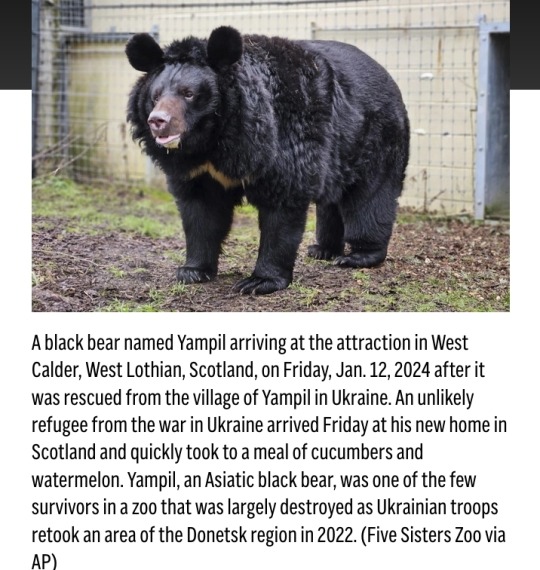
By Brian Melley, AP News
13 January 2024
LONDON (AP) — An unlikely refugee from the war in Ukraine — a rare Asiatic black bear — arrived at his new home in Scotland on Friday and quickly took to a meal of cucumbers and watermelon.
The 12-year-old Yampil was named for a village in the Donetsk region where he was one of the few survivors found by Ukrainian troops in the remains of a bombed-out private zoo.
Yampil, who had previously been called Borya, was discovered by soldiers who recaptured the devastated city of Lyman during the Kharkiv counteroffensive in the fall of 2022, said Yegor Yakovlev of Save Wild, who was among the first of many people who led the bear to a new life.
The bear was found in a menagerie that had long been abandoned by its owners.
Almost all the other animals had died of hunger, thirst or were struck by bullets or shrapnel and some were eaten by Russian troops.
Yampil narrowly missed the same fate, suffering a concussion from a projectile that landed nearby.
“The bear miraculously survived,” said Yakovlev, also director of the White Rock Bear Shelter, where the bear recovered.
“Our fighters did not know what to do with him, so they started looking for rescue.”
What followed was an odyssey that your average bear rarely makes, as he was moved to Kyiv for veterinary care and rehab, then shipped to a zoo in Poland, then to an animal rescue in Belgium, where he spent the past seven months, before landing in the United Kingdom.
Brian Curran, owner of Five Sisters Zoo in West Calder, Scotland, said his heart broke when he learned of the plight of the threatened Asiatic black bear.
“He was in terrible condition; five more days and they wouldn’t have been able to save him,” Curran said. “We were just so amazed he was still alive and well.”
The bear was skinny but not malnourished when he was found, said Frederik Thoelen, a biologist at the Nature Help Center in Belgium.
He now is estimated to weigh a healthy 440 pounds (200 kilograms), Thoelen said.
The nature center in Belgium, which usually treats injured wildlife and returns them to their natural settings, has taken several animals rescued from the war in Ukraine, including a wolf, a caracal cat and four lions, though those animals had not experienced the ordeal Yampil endured.
It was remarkable how calm Yampil was when he arrived in Belgium, Thoelen said.
The bear was trained in the past two weeks to move from his enclosure to the crate that would transport him across Belgium to Calais, France, then across the English Channel on a ferry to Scotland.
Pastries from a local bakery were used for good measure to lure him Thursday into the cage, where he was sedated for the journey.
“We want to use the food that he likes most, and for most bears — and for people also — it’s sweet, unhealthy foods,” Thoelen said.
Thoelen had a sense of the bear’s weight as he drove the crate to the port.
“Every time when we had a red light or a traffic jam, when the bear moved a little bit, you could feel the van moving also,” he said.
“You could feel it was a heavy animal in the back of the car.”
Yampil arrived at the zoo about 15 miles (25 kilometers) west of Edinburgh and immediately made himself at home.
He feasted on cukes — said to be his favorite food — and melon, said Adam Welsh, who works at Five Sisters.
The Asiatic black bear is listed on the International Union for Conservation of Nature’s Red List of Threatened Species as vulnerable to extinction in the wild, where it can be found in central and southern Asia, Russia, and Japan.
It’s known for the distinctive white crescent patch on its chest that gives it the nickname moon bear. It can live for up to 30 years in zoos.
It’s not clear if the bear will go into hibernation. The winter has been warmer than usual but colder days are on the horizon.
The zoo has other bears, but Yampil is the only Asian bear and unique in other ways.
“We’ve had circus bears, for example, that have been rescued,” Welsh said.
“We’ve had bears rescued from places like roadside restaurants where they’ve been used as kind of roadside attractions and been kept in subpar conditions. But this is the first time that we’ve worked with an animal that’s been rescued from a war zone.”
youtube
Scottish zoo welcomes black bear which survived war in Ukraine
13 January 2024
🖤🐻🤎
#Asiatic black bear#Ukraine#Scotland#Yampil#Borya#Save Wild#White Rock Bear Shelter#Five Sisters Zoo#Nature Help Center#Belgium#Poland#International Union for Conservation of Nature’s Red List of Threatened Species#moon bear#save animals#protect wildlife#threatened species#refugee bear#private zoo#Youtube
185 notes
·
View notes
Text
Illia Ponomarenko shows us one of the many gems Kyiv has to offer: The Kyiv Pechersk Lavra (or the Kyiv Lavra of the Caves). It is considered the most significant and holiest of places in Eastern Slavic Orthodox Christianity. This is an example of what is at stake for Ukraine as Russia continues its efforts to eradicate Ukrainian history and identity.
So, about 1,000 years ago, Kyiv was living its golden age as the center of a large medieval kingdom of Rus under Prince Yaroslav the Wise—very possibly the greatest ruler of Kyiv ever.
The official residence of the rulers of Kyiv Rus was located in the town of Berestove outside Kyiv (it's now where Kyiv's Park of Eternal Glory is).
The Berestove priest Illarion sought comfort and solitude, so he dug a lonesome cave in the hills at the Dnipro riverside, where he could spend his time alone in prayers. That happened around 1051 A.D.
That guy soon became the head of the Kyiv Church and left, but more hermits followed his suit and established their shelters in those caves. Over many years, they burrowed long mazes of catacombs and established churches and monastic cells.
The monastery gradually became a grandiose Lavra, a magnificent center of religious and cultural life, the greatest in this corner of human civilization.
As early as 1073 A.D., the Cathedral of the Dormition (or the 'Great Church') was established (and you can see the modern iteration of it, the magnificent white cathedral bearing images of the saints on its walls.
Just like Kyiv, the Lavra was ruined and resurrected from ashes several times over its 1,000-year history. Mongolians seized and desolated Kyiv in 1240, and the Lavra was devastated so hard that it spent well over a century in empty ruins.
Yet, it would always rise again in all of its glory.
During WWII, the Great Church was blown up just as many other iconic locations of Kyiv, such as Kherschatyk Street (in my opinion, what happened was that the Soviets planted bombs at the Lavra upon their withdrawal from the city in 1941 and failed to detonate them on time; and Nazis took out the treasures of the Lavra and got rid of the Soviet bombs by blowing up the cathedral.
Like many other significant treasures of Kyiv, the Great Church of the Lavra was resurrected by independent Ukraine by the 2000s.
The Lavra is indeed a city within a city—I'm only showing you a tiny part of it that is popular with tourists. Unfortunately, the ancient monastery caves have been closed to visitors for over a year.
Technically, the Lavra is a giant museum with many art exhibitions, collections of historical artifacts, and recreation zones for anyone. Right now, for instance, the Lavra Historical Museum exhibits ancient Scthyntian gold from Crimea that was recently returned to Ukraine.
At the Lavra, you can easily find the resting places of many historical figures of the past, such as the one of Kostiantyn Ostrozky, the legendary ultra-rich magnate of the 15th and 16th centuries and the Lavra's lavish sponsor, or Petr Stolypin, the Russian imperial prime minister who was assassinated at the Kyiv Opera House in 1911.
Of course, the Lavra is about the iconic Great Bell Tower, one of Kyiv's most legendary landmarks. The tower is 96 meters high and can be seen from around 30 kilometers away from the Lavra.
It takes over 370 stairs to reach the tower's top -- but I'm telling you, it's 100% worth it as the Great Bell Tower shows you a truly stunning view of Kyiv, especially when the weather is fine. Fucking legend.
For centuries, until recently, the Lavra was under complete control by the Russian Orthodox Church, which is fundamentally loyal to Russia. In 2023, amid the war against Russia, Kyiv authorities and the Zelensky administration tried (and failed) to terminate the Moscow clergy's legal presence at the Lavra in 2023.
Currently, the Russian church and its monks remain in control of the so-called Lower Lavra.
In the Upper Lavra, which has most of the iconic places and locations, the recently re-established Orthodox Church of Ukraine, the de-facto successor of the old original Christian church of the Kyiv Rus, now has its divine service again.
Welcome to the beautiful ancient Kyiv.
#Ukraine#Kyiv#russia is a terrorist state#Kyiv Pechersk Lavra#Lavra#Ukrainian culture#Illia Ponomarenko#video
55 notes
·
View notes
Text
Massive missile attack on Ukraine. Today, 12/29/23.
Kharkiv has been under missile attack since 4 am, which cannot be shot down by air defense. More than 20 explosions counted during one of the 4 attacks through the entire period. The number of victims is unknown.
Odesa, missiles hit 3 residential buildings. The number of victims is unknown.
Lviv, hit an apartment building and school. The number of victims is unknown.
Dnipro, missiles hit a shopping center and a maternity hospital. The number of victims is unknown.
Kyiv, many missile fragments exploded, hitting residential buildings and yards. During this period, more than 15 people there were injured.
And that's not all the cities.
Some people are being searched under the rubble of destroyed buildings. It is already known about dead people in many cities, but number of them is unknown by now.
russia used about 7 different types of weapons. The attack lasted from midnight on 12/28/23 until this moment.
russia is a scum.
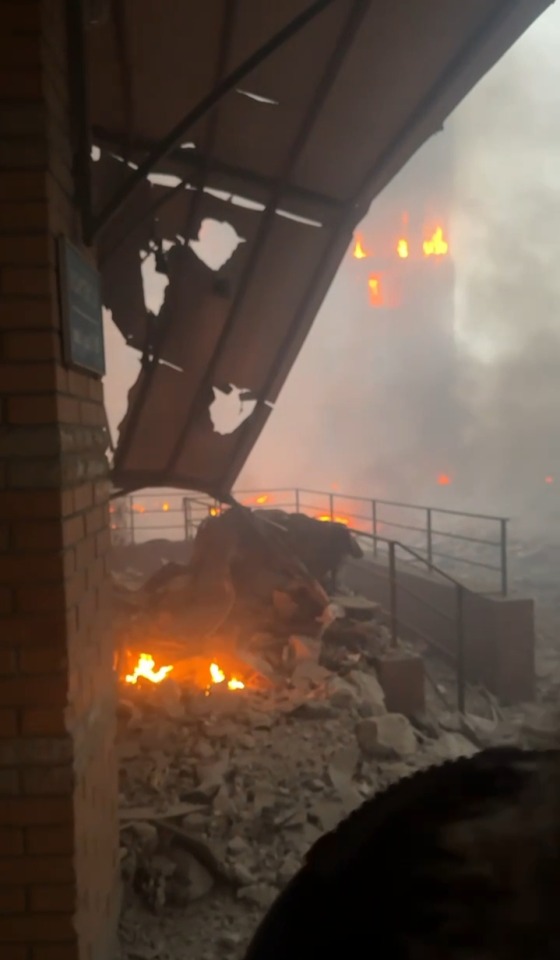
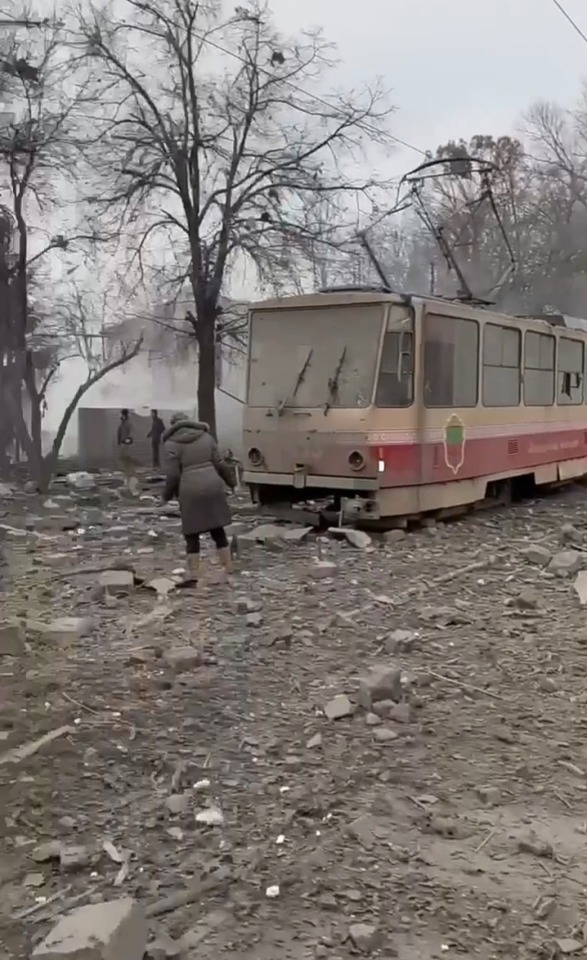



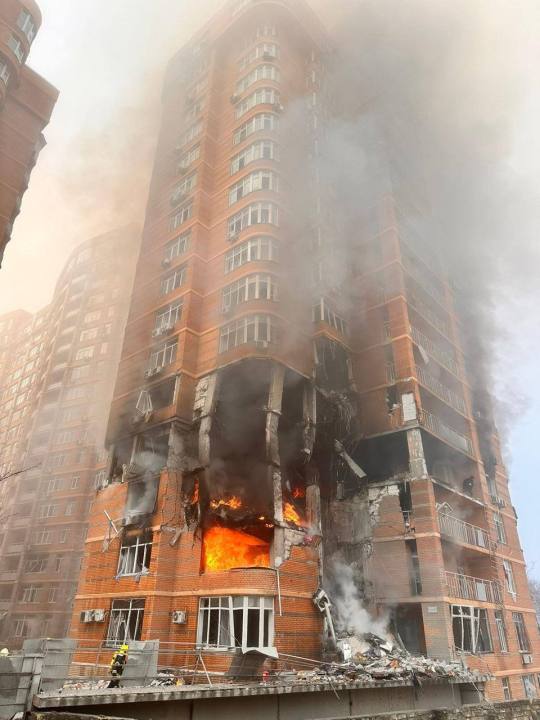

You can help people who suffered in this terrible war. Here's some funds for help:
166 notes
·
View notes
Text
Being Ukrainian, born in Russia, with family friends in both countries is an insane experience. A literal distillation of convos from the last few months:
Ukrainians: We haven’t had a full night of sleep since February. No running water for months now, and now the electricity goes out. They’re bombing us non-stop. They aim for the houses at night, and the city center and offices and schools during the day, to kill as many civilians as possible. I sent my daughter to relative safety in Kyiv, but I don’t want to leave my mother, who had a stroke due to war-induced stress and is paralyzed. The hospitals wouldn’t take her because they were full of war casualties. She lies in bed and we hope that a missile doesn’t strike our building, because she can’t go to the bomb shelter. I’ll try to call you next time we get electricity.
Russians: Ugh its so expensive to travel to Turkey right now, we decided to take a two week holiday in Sochi instead. It’s not as nice but we have to persevere. Oh, what’s that? The news? I try not too pay too much attention to it when I’m using my VPN to access instagram and twitter, it just makes me soo sad. You know I’m not political. Hopefully this little war-sy is over soon, because I have to redecorate my house and Ikea is still closed.
Westerners whose entire political philosophy is “vibes” and who think cyrillic is a type of salad: yeah, yeah. bombing, missiles, blah BLAH yawn. Frankly the real war crime is being mean to Russians on the internet.
#ukraine#russia#for me whats shocking is almost all of the russians have ukrainian family or friends#and they just dont…care#i dont expect them to protest or even speak about the war but you can tell there is ZERO empathy its so chilling#westsplaining#the war-sy thing came from one person calling it a vaynuchka I didn't know how to translate it but it made us sick
952 notes
·
View notes
Text


Today (08.07.24) russians attacked Ukraine once again. More than 40 missiles of different types. Kyiv, Dnipro, Kryvyi Rih, Slovyansk, Kramatorsk were under attack.
As it for 11:46 a.m. :
In Kyiv, among other civil infrastructure, children hospital "Ohmatyd" was hit by missile. Unofficial sources say that some children may be under the rubble. Rescue mission continues.
In Kyiv: 7 people killed, 9 injured.
In Kyiv region: 2 people injured.
For now in Kryvyi Rih: 10 killed, 31 - injured.
As it for 12:03 a.m. :
In Pokrovsk, Donetsk region: 3 people killed
In Dnipro: service station and civil apartments were damaged. Unknown number of injured.
12:09:
In Kyiv: 7 killed, 15 - injured.
12:29:
In Kyiv: 8 killed, 15 - injured

I fucking beg you, please, continue to talk about Ukraine. This is terrorism in its purest form.
15:03:
In Kyiv: 17 killed, 48 injured
In Kyiv oblast: 2 injured
In Dnipro\Dnipro region: 11 killed, 62 injured
More than 50 civil objects are damaged: apartments, busnisess center and 2 medical facilities.
#ukraine#russia terrorist state#russia#russia ukraine invasion#russia ukraine war#russian invasion of ukraine#russia is a terrorist state
39 notes
·
View notes
Text
Ukraine is said to have provided intelligence which led to deadly attacks by insurgents on Russian mercenaries in the West African nation of Mali. FYI: Tinzaouaten, the city closest to the attacks in Mali, is 2,440 miles/3,928 km from Ukraine's port city of Odesa.
Ukraine’s military intelligence agency has claimed it was involved in an ambush that killed fighters from Russia’s Wagner group in the west African nation of Mali, thousands of miles away from the frontline in Ukraine.
A Telegram channel linked to the Wagner leadership on Monday admitted the group had suffered heavy losses during fighting in Mali last week.
It said Wagner and the Malian armed forces had “fought fierce battles” over a five-day period against a coalition of Tuareg separatist forces and jihadi groups, who had used heavy weapons, drones and suicide bombers. Numerous Wagner fighters, including a commander, Sergei Shevchenko, were killed, the channel said.
Andrii Yusov, spokesman for Ukraine’s GUR military intelligence agency, said on Monday that “the rebels received necessary information, and not just information, which enabled a successful military operation against Russian war criminals”.
Yusov did not say whether Ukrainian military personnel were involved in the fighting or were present in the country. He said the agency “won’t discuss the details at the moment, but there will be more to come”.
The Mali government, which has been fighting various insurgencies in the north of the country for more than a decade, requested help from Wagner after a military junta took power in 2020.
The Wagner Group is still around but under new management since Putin killed off its founder Yevgeny Prigozhin.
So why is Russia in Africa?
The group is also active across Africa, and continues to be so even after Prigozhin was disgraced following a failed coup attempt last summer. He later died after an explosion onboard his plane, widely believed to have been ordered by the Kremlin, but Wagner’s influence in Africa remains.
“For Moscow, the African countries where Wagner is present is just a zone of interest that allows it to get hold of resources – gold, diamonds, gas and oil – and the money goes to finance Russian aggression,” said Serhii Kuzan, director of the Ukrainian Security and Cooperation Center in Kyiv, explaining why Ukraine might want to target Wagner in Africa.
He added that the raids had additional benefits for Kyiv: “liquidating” some of the most experienced Wagner fighters and lowering the overall military potential of the group, and also exacting revenge for war crimes in Ukraine.
“A significant part of the destroyed fighters got military experience in Ukraine, where they carried out hundreds or thousands of war crimes … these crimes should be punished, and Russian war criminals should know that they will never be safe,” said Kuzan.
Ukrainian intelligence has a long reach and Ukraine has a long memory for war crimes committed by the invaders.

On a linguistic note, GUR should realistically be written HUR. The full name of Ukrainian military intelligence is: Головне Управління Розвідки Міністерства Оборони України (Main Directorate of Intelligence of the Ministry of Defense of Ukraine). For short, that's Головне Управління Розвідки.
In Russian, Г is pronounced like the English hard G. In Ukrainian, Г is pronounced like a regular English H. There's a separate letter in Ukrainian for English hard G written like this Ґ. But the Soviet Union tried to suppress this letter because its existence was another reminder that Ukrainian is not Russian. So there's been some lingering alphabetic confusion over the use of this letter. But I promise you that it is preferable to transliterate ГУР as HUR.
#ukraine#mali#west africa#russia#russian mercenaries#yevgeny prigozhin#the wagner group#tuareg separatists#hur#ukrainian military intelligence#serhii kuzan#main directorate of intelligence of the ministry of defense of ukraine#russia's war of aggression#vladimir putin#россия#мали#африка#чвк вагнер#евгений пригожин#владимир путин#путин хуйло#путин - военный преступник#добей путина#руки прочь от украины!#геть з україни#малі#сергій кузан#головне управління розвідки міністерства оборони україни#слава україні!#героям слава!
22 notes
·
View notes